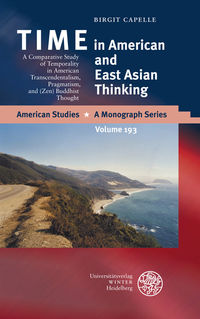
TIME in American and East Asian Thinking
A Comparative Study of Temporality in American Transcendentalism, Pragmatism and (Zen) Buddhist Thought
1. Auflage, 2011
384 Seiten
ISBN: 978-3-8253-5798-6
Sortiment: Buch
Ausgabe: Gebunden
Fachgebiet: Anglistik/Amerikanistik
Reihe: American Studies – A Monograph Series, Band: 193
lieferbar: 17.02.2011
Schlagwörter:
Ostasien /Philosophie, Zeitverständnis, ostasiatisches, Nishida, Kitaro, Dewey, John, Thoreau, Henry David, Emerson, Ralph Waldo, Kyoto-Schule, Zen-Buddhismus, Pragmatismus, amerikanischer, Transzendentalismus, amerikanischer, post-metaphysisches Denken, Zeitlichkeit
This study explores the topic of time from a comparative, ‚trans-cultural’ perspective. It points out structural parallels (isomorphisms) between interpretations of reality that are distinctive of the two cultural realms North America and East Asia, emphasizing their common post- or non-metaphysical visions. Transcendentalist, Pragmatist, and (Zen) Buddhist ways of conceptualizing temporality differ radically from the established Western, primarily Christian-shaped ‚abstract’ concept of linear, teleological time. They are based on the intuitive insight that Being ‚is’ time or, “impermanence” (Skt.: ‚anitya’), and hence do not postulate the long-established Western, i.e. predominantly European, dualism of Being ‚and’ time. Like the prominent philosopher and sinologist François Jullien, the present study thus raises and deals with the fundamental question whether it is indispensable to think ‘time’ abstractly conceptually in “terms” of a separate category, dimension, or homogeneous flow.
""
Ulfried Reichardt in: Anglia, Bd. 130 (2012), Heft 4, 597ff




